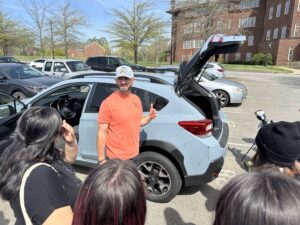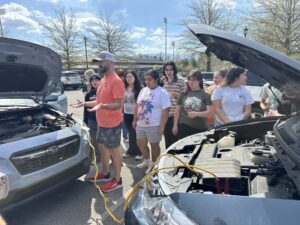GREENEVILLE – Local high school students who participate in the Upward Bound and Upward Bound Math and Science programs recently received valuable guidance on budgeting and car maintenance during an event at Tusculum University.

Aaron Barnett talks about an element of car care with students.
These two federal grant programs serve students whose parents or guardians do not have a bachelor’s degree or who come from low-income households. They encourage students to pursue their dreams and enroll in college.
To drive home that point, Catherine Pearson, Tusculum’s project director for Upward Bound in Cocke and Hawkins counties, conducted a budgeting exercise in the Meen Center, that highlighted how much more disposable income students would likely have if they obtained at least a bachelor’s degree.
In the exercise, Pearson split the students into two groups. One group played the role of individuals who had gone to college and had a variety of career options open to them that required a degree. The other group represented people who did not attend college and had different work opportunities for which a degree was not necessary.
“The students were given a fake paycheck and told what essential expenses they had to pay, such as rent, electricity, car payments and cell phones,” Pearson said. “They were able to divide the rest of their budget and decide how much to spend on groceries, how much to spend on gas and how much to allocate for Netflix and the internet. They saw how difficult it was to budget on a much lower salary and what salary was needed to live comfortably. They also received some advice on how to put back for retirement savings.”
The overarching point of the exercise was to show that a college degree provides more disposable income for people as well as to provide guidance on constructing a personal budget and prioritizing essential expenses. People who do not have a degree and are paid by the hour have more challenges paying for items.
After the students examined a budget from one financial perspective, they switched with each other to consider the cost of living for the other income level.

Aaron Barnett discusses car care with students.
In a different presentation, Aaron Barnett, an advisor in the Upward Bound Math and Science program, shared practical guidance on what car care students could complete on their own and when they should rely on a mechanic. Among the subjects he addressed were jumpstarting a vehicle and how to check and change the oil. He also discussed with the students about changing an air filter and a tire.
Even if students can fix a problem with their vehicle by themselves, they might need to decide whether the time it would take would be worthwhile or whether it would be wiser to rely on a mechanic to take care of the task.
Barnett brought a couple of cars to the Meen Center to demonstrate for the students some of what he shared verbally.
One other component of the Life Skills session was advocacy. Erin Frizzell, director of Upward Bound at Tusculum, provided the students with background information about federal TRIO programs, which date to the 1960s. Tusculum has seven TRIO programs, which have been started at various points in the last 52 years.
“Some students do not fully understand the history of our programs and where we receive the funds for them,” Frizzell said. “We just want them to know the reasoning for our program. We tied that into a lesson about the importance of speaking up for their beliefs and interests. It’s an important skill to learn how to speak up on the things that mean something to them. We want them to do that for TRIO programs because they are benefiting from a federal program.”
Students expressed their support for the programs by filling out postcards during TRIO Day in February, which were well received in Washington. Frizzell said elected officials want to hear from students, so Tusculum’s TRIO leaders provide students with tactics to accomplish that while impressing upon them the value of speaking up about what matters to them.
Frizzell said all of the discussion taking place in Washington has resulted in students seeking information from the Upward Bound and Upward Bound Math and Science staff. They are curious how this might impact them, she said.
The Life Skills event also featured a canned food drive as part of the community service component of the two programs. Accepted items were for humans and pets, and they were donated to Second Harvest Food Bank.
Additional information about the TRIO programs at Tusculum is available at https://site.tusculum.edu/student-success/academic-affairs/first-gen/. To learn more about the university, please visit www.tusculum.edu.


